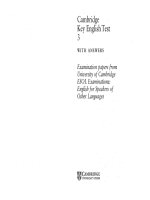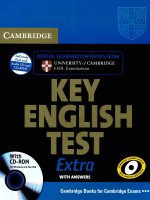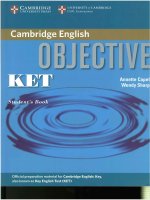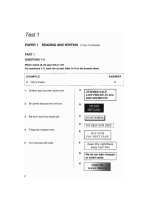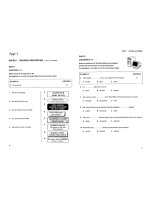001 cambridge KET extra book(4)
Bạn đang xem bản rút gọn của tài liệu. Xem và tải ngay bản đầy đủ của tài liệu tại đây (3.01 MB, 47 trang )
Listening PART 2
Now listen to the recording again and check these
notes made by a candidate.
Check your answers when you listen for the
second time. Remember you can only use an
option once.
Question 6
e or H- (sci.ence or tem&i.$)
TutSdi2U
Question 7
Before you listen, look at everything written on the
question paper for this part.
wed nes ci
1 What are the headings for the two lists, 6-10 and A
—H?
Question 8
Thursoict
F (5?Givash)
2 Which letter, A—H, can you not use as an
answer?
Question 9
Fr.ciA
D ? (pi.Civvo)
Listen to the recording once.
Question 10
satu.roi u
c, (swiwtkvvti.o..g)
?
Did you help the candidate get the right answers?
PART 2
QUESTIONS 6-10
Listen to Jane telling her father about the extra subjects she is doing at school.
What subject does she do on each day?
For questions 6-10, write a letter A-H next to each day.
You will hear the conversation twice.
0
Exampl
e:
C
Monday
Day
s
Subjects
Tuesday
6
Wednesday
A
art
B
computer club
C
7
Japanese
D
piano
E
science
F
Spanish
G
swimming
H
tennis
Thursday
8
Friday
9
Saturday
10
120
I T EST 4
•
PAPE R 2
•
Li sten in g PA RT 2
Listening PART 3
Imagine you are the person who wants the
information.
All the answers to the questions will come from
one person only in the conversation.
Look at the instructions, the example and the five
questions, 11-15. Answer these questions.
1 Who is giving the answers in the conversation?
2 What is the conversation about?
The friend is asking Peter questions. Imagine
you are Peter's friend. 'What questions could
you ask him to get the answers to all the
questions?
In the example, Peter says that he went to
Durham on Friday. So the question must be,
'When did you go to Durham?'
Now think of all the questions you could ask
Peter, to get the answers for questions 11-15.
Now listen to what Peter says on the recording and
answer questions 11-15.
PART 3
QUESTIONS 11-15
Listen to Peter talking to a friend about a school trip. For questions 1115, tick (✓) A, B or C.
You will hear the conversation twice.
Example:
0
11
12
Peter went to Durham on
The first place Peter visited was the
Peter enjoyed listening to a talk about
A
Wednesday.
B
Thursday.
C
Friday.
A
castle.
B
C
museum.
cathedral.
A
paintings.
stamps.
B
C
13
14
15
Peter thought the castle was
In a shop, Peter got
Peter took photographs of
i
clocks.
A
empty.
B
C
cold.
dark.
A
a book.
B
C
some food.
postcards.
A
windows.
TEST 4
• PAPER 2 •
Listening PART 3
121
B
C
people.
a bus.
Listening PART 4
Sometimes in this part you will have to write a
day of the week or a month of the year. Can you
spell the days of the week and months? Do a quick
spelling test now and write the 7 days and 12
months. Check your spellings in a dictionary.
Practise saying the alphabet and listening to
spellings and long numbers.
Look at these names.
DESLAY TISELEY TISLIY DISLEY DESLIY
For questions 16-20, you may have to write down
spellings or phone numbers that you hear in the
recording.
Practise saying the spellings of these names to
yourself, out loud, letter by letter. For example,
D E S L A Y. Make sure you know the
names of the vowel sounds A, E and I.
Look at the notes about a theatre visit and decide
what kind of information you will need to listen
for to answer questions 16-20. Are you listening
for numbers, times, dates, prices, ages or spellings
of names or a word?
One of these names is the answer to question 18.
Now listen to the recording and answer questions
16-20.
Before you listen to the recording, look at the list
of surnames and phone numbers below. Practise
reading these out so that someone else can write
them down. Do not show the other person the
names or numbers.
Greenwood 8855738
Plainer
9562224
Dunmore 3992018
Whitestone 1638264
Henderson 4728900
PART 4
QUESTIONS 16-20
You will hear a telephone conversation about a show at a theatre.
Listen and complete questions 16-20.
You will hear the conversation twice.
THEATRE VISIT
CiAn,c{erella
Play:
There are tickets for:
1
6
...........................................April
A child's ticket costs:
1
7
£
Name of main actor:
1
8
Sopk it..................................
Show begins at:
For information about
Children's Club, phone
122
TEST 4
• PAPER 2 • Listening PART 4
19
20
P"--
PAPER 3 Speaking (8 -10 minutes)
Listening PART 5
This information and the prompts on the left of
the notes can help you to find the information you
need to answer questions 21-25.
Use the information in the notes to help you.
Before you listen to the recording, look at the
phone message. In the message, some information
has already been filled in: 'Bike shop', `e, 'bicycle',
`p.m.' and 'King Street'.
Look at the notes and underline all the words that
help you know what kind of information you need
to listen for in questions 21 25.
-
Now listen to the recording and answer questions
21 25.
-
PART 5
QUESTIONS 21 - 25
You will hear a man leaving a
message. Listen and complete
questions 21-25. You will hear the
information twice.
Phone Message
From:
Colour of bike:
g.1.12e shop
-
2
1
Bike costs:
Shop has also got:
Come tonight before:
Address to go to:
2
2
E.................................
2
3
Ini-ccte ..........................
2
4
2
5
Here
are some
examples of the kind of questions
........................
kilA,g
stveet
the examiner will ask you.
_
You now have 8 minutes to write your answers on the
answer sheet.
1 How much homework does your teacher give
you?
2 What
subjects did
The Speaking
testyou
lastsstudy
8 to at
10school?
minutes. You will
take
the
test
with
another
candidate.
There are two
3 When will you go back to your country?
examiners,
but
only
one
of
them
will
talk
to you. The
4 What did you do yesterday?
examiner will ask you questions and ask you to talk
5 What
do next weekend?
to the2will
Part
other
(3-4you
candidate.
minutes)
You and
partner
will speak to each other. You
6 What
do your
you like
to read?
Part
1
(5-6
minutes)
will ask and answer questions. The examiner will
Which
questionswill
areask
about the
past,
are
The
andinformation
your which
partner
some
give examiner
you a booklet
withyou
some
in124
it.
The
about
the present
and
which are
about
the future?
questions.
These
questions
will
be
about
your
daily
I
examiner will give your partner a booklet with
some
TEST
life,
past
experience
and
future
plans.
For
example,
Inwords
the first
the test
Practise
answering
these
questions
using
thewill
right
in it.part
Yourof
partner
willthe
useexaminer
the
words
in the
TEST
4 have
•
PAPER
2 • Liabout
st en inyour
g PART
5
123
you
may
to
speak
school,
job,
ask
you questions
about
your about
daily the
life,information
past
tenses.
booklet
to
ask
you
questions
Make
sure
you
can
talk
about
past,
present
hobbies 1
or home town.
Speaking experiences
PART
and
future
plans.
you have.
you
will
change roles.
andThen
future
events.
4
• PAPER 3 •
Speaking PARTS 1-2
Speaking PART 2
If you think your question is wrong, correct
yourself by asking it again.
In the second part of the test the examiner wants
to know if you can ask questions in English, using
correct grammar.
Look at the information 4A on page 133. This
is about maths lessons. There are also prompt
questions 4B on page 131.
Look at 4B and then look at these questions.
1 When these maths lessons are?
2 What name of teacher?
3 Has teacher telephone number?
4 What cost maths lessons?
5 Where maths lessons?
All of these questions are grammatically wrong.
In some, the word order is wrong; in others, there
are words missing. Others use the wrong question
word. Correct the sentences.
Now practise what to say when you correct
yourself.
Here are some phrases you may want to use.
No, that's wrong. I'll say that again.
I mean ...
I'll do that again.
Now, when you know your question is wrong,
correct yourself and ask the right question. For
example,
When these maths lessons are? I mean ... when are the
maths lessons?
Practise correcting yourself when you do the task
about a school trip on pages 137 (4C) and 135
(4D).
Paper 3 frames
Tests 1-4
Part 1 (5-6 minutes)
Greetings and introductions
At the beginning of Part 1, the interlocutor greets the candidates, asks for their names and asks them to
spell something.
Giving information about place of origin, occupation, studies
The interlocutor asks the candidates about where they come from/live, and for information about their
school/studies/work.
Giving general information about self
The interlocutor asks the candidates questions about their daily life, past experience or future plans. They
may be asked, for example, about their likes and dislikes, or about recent past experiences, or to describe
and compare places.
Extended response
In the final section of Part 1, candidates are expected to give an extended response to a 'Tell me something
about ...' prompt. The topics are still of a personal and concrete nature. Candidates should produce at least
three utterances in their extended response.
T ES T 4
• PA PER 3 •
Speaking PARTS 1-2 I 125
Test 1, Part 2 (3-4) minutes
Note: The visual materials for Part 2 appear on pages 130, 132, 134 and 136
The interlocutor introduces the activity as follows:
Interlocutor:
(Pablo), here is some information about a bird park.
(Interlocutor shows task 1A on page 130 to Pablo.)
(Laura), you don't know anything about the bird park, so ask (Pablo) some questions
about it.
(Interlocutor shows task 1E3 on page 132 to Laura.)
Use these words to help you. (Interlocutor indicates prompt words.)
Do you understand?
Now, (Laura), ask (Pablo) your questions about the bird park, and (Pablo), you answer them.
Lightwood Bird Park
1A
1B
Bird park
•wh a t / s e e?
• o p e n / Fe b r u a r y ?
Look ar beannfid bords from Europe. Africa and Asia
Learn how birds fly
February to December
10 a.m. - 5
L2 children
L4 adults
When the candidates have asked and answered their questions about the bird park, they then exchange roles
and talk about a different topic.
The interlocutor introduces the activity as follows:
Interlocutor:
(Laura), here is some information about an elephant ride.
(Interlocutor shows task 1C on page 134 to Laura.)
(Pablo), you don't know anything about the elephant ride, so ask (Laura) some questions about it.
(Interlocutor shows task 1D on page 136 to Pablo.)
Use these words to help you. (Interlocutor indicates prompt words.) Do
you understand?
Now, (Pablo), ask (Laura) your questions about the elephant ride, and (Laura), you answer
them.
Note: Candidates are assessed on both their questions and answers in Part 2 of the test.
1D
1C
You can nde an
elephant next
•
name /
elephant?
•
when / rlde?
•
price? £?
Safe for young children
•
In zoo?
Tel: 371294 to
book
•
dangerous?
Saturday
in City Park
126
Elephant ride
Paper 3 frames
Test 2, Part 2 (3-4) minutes
Note: The visual materials for Part 2 appear on pages 130, 132, 134 and 136
The interlocutor introduces the activity as follows:
Interlocutor:
(Pablo), here is some information about some football lessons.
(Interlocutor shows task 2A on page 132 to Pablo.)
(Laura), you don't know anything about the football lessons, so ask (Pablo) some questions
about them.
(Interlocutor shows task 2B on page 130 to Laura.)
Use these words to help you. (Interlocutor indicates prompt words.)
Do you understand?
Now, (Laura), ask (Pablo) your questions about the football lessons, and (Pablo), you
answer them.
Football lessons
2A
•where?
•day?
•for adul ts?
•cost? £?
FOOTBALL
LESSONS
2B
Tuesdays and Fridays
For players 12 - 16 years old
•time?
p.m.f3 per
lesson
Must Mustwear
football boots.
When the candidates have asked and answered their questions
about the football lessons, they then exchange roles and talk
about a different topic.
The interlocutor introduces the activity as follows:
Interlocutor:
(Laura), here is some information about a running race.
(Interlocutor shows task 2C on page 136 to Laura.)
(Pablo), you don't know anything about the running race, so ask (Laura) some questions about
it.
(Interlocutor shows task 2D on page 134 to Pablo.)
Use these words to help you. (Interlocutor indicates prompt words.) Do
you understand?
Now, (Pablo), ask (Laura) your questions about the running race, and (Laura), you
answer them.
Note: Candidates are assessed on both their questions and answers in Part 2 of the test.
2C
Sunday 11th October at 9.00 a.m.
2D
RACERUNNING
10 kilometres Prh: eMes13 0:'
First Prize £100
Phone Andy Smith: 683217
Running race
•
where / start?
•
lon g r a ce ?
•
what / prize?
•
date ?
•
more Information?
?
Paper 3 frames 127
Test 3, Part 2 (3-4) minutes
Note: The visual materials for Part 2 appear on pages 131, 133, 135 and 137
The interlocutor introduces the activity as follows:
Interlocutor:
(Pablo), here is some information about a sailing school.
(Interlocutor shows task 3A on page 131 to Pablo.)
(Laura), you don't know anything about the sailing school, so ask (Pablo) some questions
about it.
(Interlocutor shows task 3B on page 133 to Laura.)
Use these words to help you. (Interlocutor indicates prompt words.)
Do you understand?
Now, (Laura), ask (Pablo) your questions about the sailing school, and (Pablo), you
answer them.
Sailing school
•
3A
where?
Sailing School at Bluewater
3B
Lake
•
cost? C?
•
when? It's easy and fun!
•
Classes
for adults
di ffi cu lt
?
and children
children's
2 -lessons?
4 p.m. every
Sa tu rd ay
Learn to sail
•
£20 per lesson
When the candidates have asked and answered their questions
about the sailing school, they then exchange roles and talk about
a different topic.
The interlocutor introduces the activity as follows:
Interlocutor:
(Laura), here is some information about a job advertisement.
(Interlocutor shows task 3C on page 135 to Laura.)
(Pablo), you don't know anything about the job advertisement, so ask (Laura) some questions
about it.
(Interlocutor shows task 3D on page 137 to Pablo.)
Use these words to help you. (Interlocutor indicates prompt words.) Do you
understand?
Now, (Pablo), ask (Laura) your questions about the job advertisement, and (Laura), you
answer them.
Note: Candidates are assessed on both their questions and answers in Part 2 of the test.
3C
ARE YOU
LOOKING FOR
We need a Cook
25 hours per week
July - September in the Park Hotel
E6.40 per hour
Call 776 2143
128
Paper 3 frames
3D
Job
• where / Jo b?
• whet / Job?
• how much / eam?
• hours per week?
• te le phone numb er ?
Test 4, Part 2 (3-4) minutes
Note: The visual materials for Part 2 appear on pages 131, 133, 135 and 137
The interlocutor introduces the activity as follows:
Interlocutor:
(Pablo), here is some information about a maths teacher.
(Interlocutor shows task 4A on page 133 to Pablo.)
(Laura), you don't know anything about the maths teacher, so ask (Pablo) some questions
about him.
(Interlocutor shows task 4B on page 131 to Laura.)
Use these words to help you. (Interlocutor indicates prompt words.)
Do you understand?
Now, (Laura), ask (Pablo) your questions about the maths teacher, and (Pablo), you
answer them.
4A
Maths teacher
43a 17=
4B
873 a 29.
45617=
Maths lessons
073 a 29=
Richard
Wilson have asked and answered their questions
When the
candidates
about
the maths teacher, they then
•
w
hen?
will give lessons at your home
exchange
roles
and
talk
about
a
different
topic.
•
name / teacher?
on weekdays after 6 p.m.
976 —533 =
476 — 533 .
The interlocutor
introduces the activity as follows:
£18 for one hour
•
telephone number?
•
cost?
•
where?
Telephone 576980
Interlocutor:
(Laura), here is some information about a school trip.
(Interlocutor shows task 4C on page 137 to Laura.)
(Pablo), you don't know anything about the school trip, so ask (Laura) some questions
about it.
(Interlocutor shows task 4D on page 135 to Pablo.)
Use these words to help you. (Interlocutor indicates prompt words.) Do you
understand?
Now, (Pablo), ask (Laura) your questions about the school trip, and (Laura), you answer
them.
Note: Candidates are assessed on both their questions and answers in Part 2 of the test.
4C
School trip to
Science
Museum
Wednesday 12th October
leave school 7.30
ant return school 5.30
p.m.
4D
School trip
• date ?
• what / visit?
• expensive?
• when / pay?
£15 (with lunch M a restaurant)
Pav School Secretary by 30th
•
time / return?
September
Paper 3 frames
129
Visual materials for Paper 3
1A
Lightwood Bird Park
Look at beautiful birds from Europe, Africa and Asia
Learn how birds fly
February to December
10 a.m. — 5 p.m.
2B
3A
Sailing School at Bluewater Lake
Learn to sail
It's easy and fun!
Classes for adults
and children
2 — 4 p.m. every
Saturday
£20 per lesson
Maths lessons
4B
45 x 17 =
873 ÷ 29 =
• when?
teacher?
976 - 533 =
• name /
• telephone
number?
•cost?
Visual materials
131
1B
Bird park
•
what / see?
• open /
February?
•
what / learn?
• child's ticket?
£?
2A
FOOTBALL
LESSONS
Tuesdays and Fridays
For players 12 16 years old
—
6 — 8 p.m.
Must wear
football boots.
NORTH ROAD SPORTS CENTRE
132
Visual materials
3B
Maths teacher
4A
45 x 17 =
873 -: 29 =
Richard Wilson
976 - 533 =
will give lessons at
your home on weekdays after
6 p.m.
k18 for one hour
Telephone 576980
Vi s u a l m a t e r i a l s
133
1
C
Katie the
Elephant!
You can ride an elephant
next Saturday
in City Park
f2
Safe for young children
Tel: 371294 to book
2D
134
Visual materials
3C
ARE YOU
LOOKING FOR
A JOB?
We need a Cook
25 hours per week
July - September in the Park Hotel
£6.40 per hour
Call 776 2143
4D
Visual materials
135
ID
2C
Sunday 11th October at 9.00 a.m.
RUNNIN
G
RACE
10 kilometres
Starts: King's Bridge
Finishes: West Park
First Prize £100
Phone Andy Smith: 683217
136
Visual materials
3D
J
o
b
• where / job?
• what / job?
• how much / earn?
• hours per week?
• telephone number?
4C
School trip
to
Science
Museu
Wednesday 12th October
leave school 7.30
a.m. return school
5.30 p.m.
£15 (with lunch in a
Pay School Secretary by 30th September
restaurant)
Visual materials
137
TEST 1
PAPER 1 • Reading and Writing
Reading
Part 1 — Extra material
Possible answers for important words are:
Question 0: not / pay
Question 1: job / telephoning / number
Question 2: pay / cash
Question 3: sometimes / don't / book
Question 4: find / looking for / get / money
Question 5: shop / lower prices
1 notices D, E and H have telephone numbers
2 cheque / credit card
3 A and B
4 C (£.50), D (£6), H (£.50)
5 cheap / less expensive
Part 1 Exam material
—
1 D
2 B
3 A
4 H
5 F
Part 2 Extra material
—
1 playing sport
2 a girl playing football
Part 2 Exam material
—
6 B
7 B
8 C
9 A
1 0
A
Part 3, Questions 11-15 — Extra material
14 customer in
shop
a shop
assistant
in a shop explaining
what you
want to
buy
15 a person
a friend /
having a
family
conversation member
at home asking what
colour the
room will
be
Part 3, Questions 11-15 — Exam material
11 C
12 A 13 B
14 C
15 B
Part 3, Questions 16 20 Extra material
-
—
1 Clare and Frank
2 they are friends
3 a car
4G
5 Frank's dad
1 Yes, but he needs to practise.
2 No, but she will learn next year.
3 He's going to go for a drive in the car.
4 He asks Clare to go with him.
5 Frank's dad will go with them.
Part 3, Questions 16 20 Exam material
-
16H
17D
18F
—
19E 2013
Part 4 Extra material
Words to underline: 1st sentence: late, 11 o'clock,
—
Who are you?
Who are you speaking to?
Where are you?
What are you doing?
11
a person on the phone
the caller
at home
answering
the phone
12
138
I TEST 1 • PAPER 1 •
Reading and Writing
each evening
2nd sentence (2nd paragraph): time, early, late
3rd sentence: before midnight, takes six minutes
4th sentence: usually, for about an hour
5th sentence (3rd paragraph): always, before
6th sentence: then, short time
7th sentence: later on, too much time
8th sentence: sometimes
12th sentence (last paragraph): after lunch, two
o'clock
last sentence: rest of the day, always, for an hour,
before
These questions ask about the different things that
happen at different times in Sean's day:
Question 22: when he arrives home after work
Question 23: in the morning
Question 26: begins in the afternoon
Question 27: usually / for an hour during the
evening
Part 4 Exam material
E
x
t
r
a
m
21 A 22 B 23 B 24 C 25 B
26 A 27 A
a
t
Part 5 Exam material
e
r
—
—
28 B 29 C 30 A 31 B 32 C
33 B 34 A 35 B
i
a
Writing
Part 7 Exam material
l
For questions 41-50, ignore capitals / absence of
capitals. Spelling must be correct.
41 to
42 look/search/ask
43 on/about
44 any 45 a/these 46 how
47 it/Sicily/you
48 would/should
49 do/can
50 soon/fast/quickly
P
Part 8 Extra material
b
—
—
1 students
2 at the Forest Cafe
3 up to £24
4 the weekend / Saturday and Sunday
5 telephone 357550
6 a waitress and a cleaner
7 waitress — £4 per hour / cleaner — £3.50 per hour
8 waitress — 6 hours / cleaner — 3 hours
9 waitress — Saturday evening / cleaner — Sunday
10 call the cafe manager
11 waitress
o
s
s
i
l
e
a
n
s
w
e
r
P
s
a
r
:
t
6
-
places
hotel
pool
restaurant
airport
city
guest house
clothes
sun hat
swimsuit
dress
shorts
sunglasses
transport
plane
car
boat
train
coach
things to take with yo
luggage
ticket
suitcase
passport
driving licence
travel insurance
camping site
tourist information
centre
camera
money
credit card
towel
tent
Part 6 Exam
material
—
For questions 36-40,
spelling must be
correct. 36 beach
37
suitcase
38
passport
39 towel
40 postcard
Part 7 Extra
material
—
1
2
3
4
5
the island of Sicily
her homework
in the library
three
by email / quickly
Part 8 Exam
material
—
For questions 51-55,
spelling must be
correct. 51 waitress
Saturday
53
6/six
54 357550
(E)4(.00)/four
(pounds)
Part 9 Extra
material
—
1 Nick, in Class 5
2 all students in the
school
3 a school concert
4 three questions
5 Yes, he writes to
Nick.
6 Yes, he answers all
three questions: I
like jazz, I can play
the piano, this
afternoon ... at 1.30.
T EST 1
• PAPER 1 •
Readin g an d Writin g
I 139
7 'Bye / Pedro'
8 There are two grammar mistakes, an extra 'a'
before 'time' and a missing 'the' before 'school hall'.
9 Pedro got the full 5 marks for this note. The
message is clear and he answers all the questions
well.
10 No, it should be to Nick, not 'Students'.
11 No, only the first question, about the music
they like, is answered. For the other two points
this candidate has written questions — this is the
wrong thing to do.
12 No, it is not clear because there is no name at the
end of the note.
13 No, this note only got one mark because only
one question was answered.
Sample Answer
C Mark: 3
'ear
I lace rockynkoi&beaksk cei I have/ ina.ny CDs- Of
ELvi,k Pre4ely I can/ tell to- you wukst In CDk of
rock and/ pop (only if you/lace.) . I have. free
tune' at 7 any to- 9pvn.. I have ct. &in.& wholknow a- about pnwie. H via-me' 1.4 , Peter tocall. hi,vn. 676 540
Bye Bye
antoyv
All three parts attempted although the offer of help
requires some interpretation.
Part 9 Exam material
Sample Answer
The three pieces of information that must be
communicated are:
i What music do you like?
ii What can you do to help with the concert?
iii When are you free to come to a meeting about
the concert?
D Mark: 2
—
Sample Answer
A Mark: 5
Hi. Nick,
I'cL lace to- help wLth. the concert I lacejavt
and. Cf you need/ha/4d/, I cart. to- play the
piano-. I have a tinte/thi* afternoon,. can/ I
meet you/ at / .30 at school/ hall.?
Bye/
All three parts clearly communicated.
Sample Answer B
Mark: 4
Dear Nick,
I lace/pop ituksiz. and, rack mikai.c.. I cary try
si,nger for the concert and. I can. see/ yow toorgani4e. the concert OVI. WeaneiSdayle iyeaukse,
I have not homework..
lkseppe.
Hello- 1‘11,cla !
I lac& disco- mug° very mach. At ho-me/
I li.stery to- 1.tvery muck My favourite/
A na4tasia. If yolk lace/ I can, help with,
everything: I'd. lace. see an, concert a. }Ivy
favourite.. see you/ later!!
L ai.4a/
Two parts communicated, some errors.
Sample Answer E
Mark: 1
He1.1.o. My name/ 14, Alejanarcr. I n. the concert
the mimic. pre fiere 14e the pop. Iry thR/concety
the peopl&la,ac, a deCnk. / rt. the interm,scly I
prefer& one actacLow. Bye.
Only one part of the task communicated.
Three parts clearly communicated with some errors.
140
I TEST 1 • PAPER 1 •
Reading and Writing
PAPER 2 Listening
Part 1 - Extra material
Question 1
weather, cloud/cloudy, rain/raining/rained,
storm, sunny/sunshine/sun, warm, hot,
wet, cold, sky
Question 2
shop/shopping, clothes, hat, T-shirt, jeans,
trousers, spend, buy/bought, pay, cheap, expensive,
market
Question 3
5, 7 and 10 kilometres, distance, long way,
how far / not far, near, close, can walk, by car,
beach, sea, drive, straight on
Question 4
sport, play, tennis, ball, football, golf, club, game
Question 5
restaurant, cafe, cup of coffee, the bill,
to pay, a menu, food, lunch, dinner, snack, pizza,
tomato soup
Part 1 Exam material
—
l A
2 C
3 B
4 C
5 B
1 a woman and her son, Chris
2 Chris
3 Chris will phone his grandparents.
Times in the recording:
1 eleven o'clock
2 twelve
3 one o'clock
4 twelve thirty
5 one o'clock
6 half past one
7 two o'clock
Part 2 Exam material
—
8 G
9 D
1 0
Part 3 Exam material
11 C 1 2 A 1 3 A 1 4 B 1 5 B
—
Part 4 Extra material
—
Question 16: a word — something sold in a
department store
Question 17: a time (morning)
Question 18: a day of the week
Question 19: an amount of money in pounds
Question 20: a spelling of a name
Possible answers:
1 'You'll start every morning at ... a.m.' / 'Work starts
at ... a.m.' / 'Work begins early at ...' PYou must
start work at ... a.m.'
2 'You'll work from Tuesday to ...' / 'The job is from
Tuesday to ...'
3 'Pay per hour is £
/ 'You'll be paid £
hourly'
4 'Send a letter to Mrs ...' / 'Write a letter to Mrs
...'
—
—
7 A
1 Amanda and a friend
2 11
3 ice cream
4 no
5 no, in the evening
Part 4 Exam material
Part 2 Extra material
6 B
Part 3 Extra material
—
Possible answers (words in bold are in the recording):
Which words do you think you may hear?
H
For questions 16-20, ignore capitals / absence of
capitals. Spelling must be correct.
16 (women's) coat(s)
17 (0)8.40 / eight forty
(a.m./am) ( — / to 3.30 / three thirty (p.m/pm))/
twenty to nine / 20 to 9
18 Friday/Fridays
19 (£) 5.27 / five (pounds) (and) twenty(-)seven
(p/pence)
20 (Mrs) Grable
Part 5 Extra material
—
Question 21: something in the Town Hall
Question 22: the price of something Question
23: a place
Question 24: a name
Question 25: a time
T EST 1
• PA P E R
2
•
Listening
I 141


